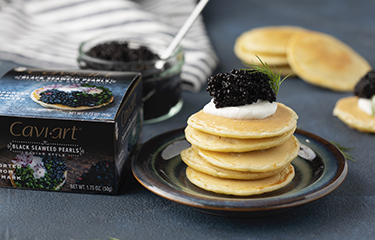SeafoodSource is closely following the plant-based and cell-based seafood alternatives market by compiling a regular round-up of updates from the sector.
- Lyndhurst, New Jersey U.S.A.-based Season Brand, a producer of canned seafood, has launched a caviar analog made of a combination of micronutrients, seaweed, vitamins, and minerals. Its Caviart is gluten-, soy-, and cholesterol-free.
"We recognized the importance of extending our product line to cater to vegan consumers. We are committed to providing accessible alternatives that not only offer great health benefits but also align with our vision of making a positive impact on our oceans,” Season Brand CEO Meriem Wadghiri said in a release. “The introduction of Caviart caviar-style plant-based Black Seaweed Pearls exemplifies our dedication to meeting the diverse needs of our customers while upholding our legacy of excellence."
Caviart is the first plant-based product in the Season Brand portfolio, and aims to “redefine luxury,” the company said.
-Singapore-based HAPPIEE seafood analog company announced its calamari and shrimp analogs have been picked up by Asda. The products will be available in Asda supermarket locations in Europe effective 3 January, according to Food and Living Vegan.
“A recent survey of Veganuary participants found that fish and other seafood is one of the food groups they miss most when trying vegan with us,” Veganuary Communications Head Toni Vernelli said. “We’re delighted to see options like HAPPIEE’s plant-based seafood emerge, providing accessible alternatives that we hope will encourage people to continue making plant-based choices well beyond January.”
- Maarten Geraets, the former managing director of Thai Union's alternative protein group, has published a study investigating the future of plant-based food.
Geraets, who joined Thai Union in 2021, left his position in November 2023. His study, “The rise of algae: The future of plant-based seafood,” published by Prescouter, explores varying levels of consumer interest globally in plant-based seafood analog products.
“Currently, we see much better traction in Europe than in the U.S. I believe that even markets in the Asia-Pacific region, which are currently lagging behind the U.S. and Europe, will catch up soon,” Geraets said. “Europe seems to have better quality products in the market at the moment. It is a consumer mindset change that needs to happen. The market is barely 1 percent of traditional meat and seafood, where meat is far ahead. It will take time but it is going to happen.”
Besides wooing additional consumer interest, the plant-based sector must improve the nutritional taste and balance, cost-effectiveness, and diversity in seafood varieties of their products, and scale up production, according to Geraets.
“Just as for plant-based meat and dairy, now also the plant-based seafood category faces the same music. Surprisingly really, is this not the same debate? Either way, dear seafood incumbents, there is no stopping this: plant-based and other alternatives are coming,” Geraets wrote on LinkedIn.
Photo courtesy of Caviart







